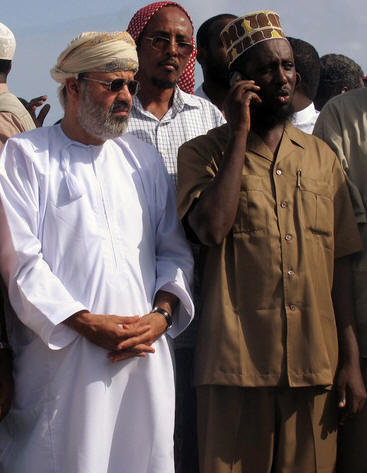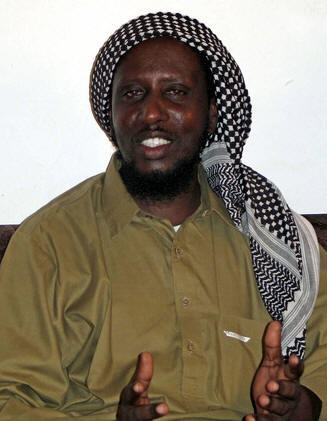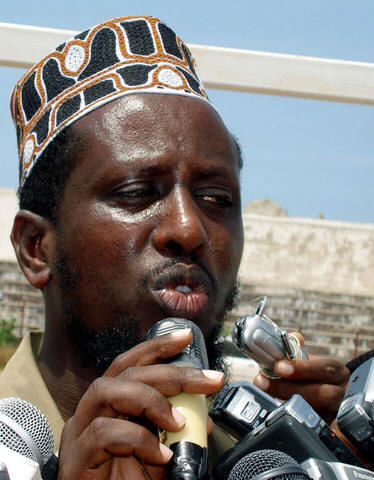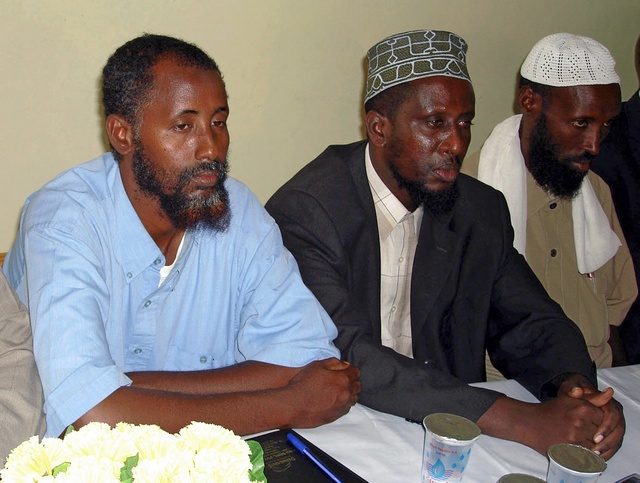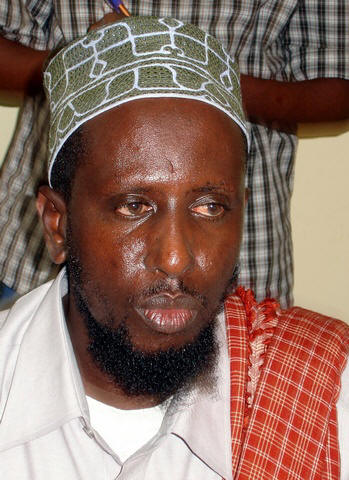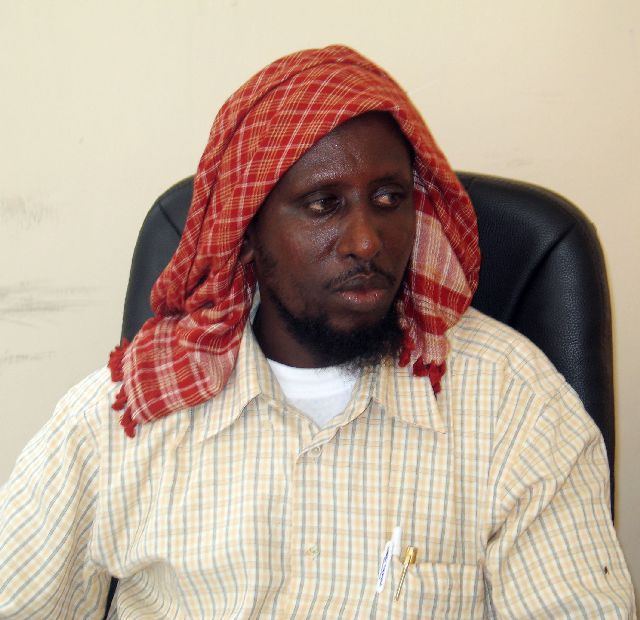| Zooming into the Past |
|
SHEIKH SHARIF AHMED PROFILED: A MAN OF THE PEOPLE
SEPTEMBER 2006
Sheikh Sh. Ahmed Profiled: A Man of the People September 12, 2006 The East African
Nairobi, Sep 12, 2006 -- SHEIKH SHARIF AHMED presents an easy demeanour despite the daunting challenges facing him as the head of the newly formed Somalia Union of Islamic Courts.
With the warlords out of Mogadishu for the first time since Somali plunged into crisis in 1991, the burning question is whether the soft-spoken Sheikh Sharif is the man to save Somalia from itself.
Adored by his people as the ultimate peace provider, but resented by the West as the embodiment of Islamic extremists out to introduce the dreaded Sharia law, Shiekh Sharif does not present a picture of an extremist. He comes across as a reconciliator.
When The East African arrived at his Huriwaa district headquarters at the heart of Mogadishu for the 11 am appointment, just over a week ago, there was no detailed security checks, no barricades and the police presence usually associated with those in his position.
A simple inspection using a metal detector and I was ushered into the compound of a one-storey building that once belonged to one of the leading warlords in Mogadishu.
There were only a few armed guards at the gate, but the compound was teeming with ordinary people waiting to seek his assistance on many issues, ranging from the security situation to the provision of social services.
His office on the first floor is modestly furnished with a medium mahogany desk and a coffee table. The only betrayal of his Islamic leaning is the framed quote from the Quran in Arabic, which he takes great pride in. He is particularly accessible, even to the media, which he regrets, has not made efforts to understand what the Islamists stand for.
Obviously, Sheikh Sharif has gained wider acceptance among Somalis compared to his predecessors - Abdulkassim Salad, who was elected in Djibouti but was confined to a section of Mogadishu, and Abdullahi Yusuf of the Transitional Federal Government (TFG) who is holed up in Baidoa.
But the Libyan trained lawyer is preoccupied at the moment with restoration of order after 16 years of lawlessness, a challenge that even he admits is daunting.
He has to convince the rest of the world that the Islamic Courts that took over the control of Mogadishu on June 5 and later gained control of six other provinces, has no intention of replacing the TFG.
He also hopes to convince the region and the Western powers that he does not intend to introduce a brand of Islam akin to the Talibans in Afghanistan. He hopes to resolve the Somali quagmire by negotiation, not military might. But he is not particularly averse to using the military option if it is required. He did chase the warlords out of Mogadishu.
As the chairman of the Union of Islamic Courts - an amalgamation of clan-based courts that were formed to fight the warlords and criminals who were terrorising Mogadishu residents - Sheikh Sharif is essentially president of the regions under the control of his faction.
But he is hesitant to think of himself on such terms, maintaining that his main task is to restore order and rescue Somalis who have been suffering at the hands of the warlords for many years.
"Unlike the warlords, who had no agenda except killing and extorting money from the Somali people, our agenda is to restore peace, start reconstruction, and bring about equity and freedom for the people," said Sheikh Sharif, who from his approach to issues, comes across as more level-headed and moderate than some of his colleagues.
He is the most probable candidate for the post of the prime minister should TFG and the courts agree on a power-sharing arrangement, although he is not willing to be drawn into the details of any government that might be created out of the ongoing negotiations.
Sheikh Sharif, 42, believes that with time, those who view the courts with suspicion will realise that it has no ulterior motive. It only wants to bring sustainable peace and initiate dialogue among the Somali people. His choice of programmes are centred on restoring order and his agenda is purely domestic.
Despite his legal training he worked as a secondary school teacher, before joining the courts in 2003 after the kidnapping of his 12-year old student. Sheikh Sharif is not worried that the United States is convinced that among the leading lights of the courts are individuals with links to terrorist groups.
"The US knows that Somalia is no a place for terrorists to hide because it is a homogenous society, where people know each other very well. However, the Ethiopians and the warlords have created this impression in order to receive funding from the Americans. I believe that the US now has the correct information that Somalia is not a hiding den for terrorists."
Another misunderstanding, according to Sheikh Sharif, is the belief that the courts are out to introduce Sharia law in areas under its control, just like the Taliban did in Afghanistan.
"The West has always had a wrong perception of Islam. Whenever it hears of Sharia law, panic sets in. But the Somali people are Muslims and they have always solved their problems and disputes through the Islamic law. We did not bring any new form of Islam to Somalia; but if the West has particular issues which need clarification, especially about the application of Islam, we are ready to explain our agenda and how we will go about it," he explained.
Still, Sheikh Sharif conceded that the nascent administration faces three major challenges as it consolidates its hold on power and negotiates with the interim government of President Abdullahi Yusuf based in Baidoa.
The first is how to managed what he termed as "misinformation," created by the warlords and Ethiopia, besides the tendency by the Western media to always seek to distort Islam. He says that since taking over, the rest of the world is yet to realise the extent of the transformation the society has undergone from chaos to peace, law and order, especially in Mogadishu.
As it is, the courts will have to work hard to convince the world that it dramatically changed the situation for the better.
Second is the threat from Ethiopia, which has warned it will invade Somalia if the courts attack the TFG in Baidoa. Sheikh Sharif insists that all the warlords who were recently kicked out of Mogadishu were financed and armed by Ethiopia for the past 16 years.
Thirdly and the bigger headache to Sheikh Sharif and the courts, is how to convince the rest of the world to help in the reconstruction of Mogadishu and the rest of the country.
Born in 1964 in Jowhar in Middle Shabelli province - 90km south of Mogadishu- Sheikh Sharif had his primary and secondary education in Somalia before joining the University of Kurdofan in Sudan, where he studied Geography and Arabic.
He later went to Libya for a degree in Law. He returned to Somalia in 2000 and founded the Somali Graduate Society, with the aim of teaching Somalis to better understand their culture.
When a colleague, Mohamed Dheere established a regional administration in Jowhar, Sheikh Sharif joined him and was appointed the head of the judiciary and law. However, the two later fell out due to what he says are differences over the administration of justice.
Following the disagreement, he went back to Mogadishu and took up a job as a secondary school teacher. He Joined the Islamic Courts towards the end of 2003, where he was elected to head the courts in Sisi area, one of the most notorious areas for kidnappings and killings.
Sheikh Sharif says that it came as a surprise to him when he was elected to head the court in Sisi, the capital city's most dangerous district.
He says his biggest challenge is to turn the many good ideas the courts have into reality. That is why he spends his free time reading any literature that can help Somalia turn around the current situation.
But even as the courts continue negotiations with TFG, Sheikh Sharif believes that the transitional government was formed without the involvement of Somali people and earn the respect of the Somali people or make its presence felt.
"Initially, people gave it a chance to restore peace. But we were forced to intervene after it became clear that the warlords had blocked all avenues for peace. We are, however, ready to resume negotiations with TFG and solve the differences in a peaceful way," he said.
One lingering worry for the TFG is that the Islamists continued expansion and that they are even ready to take over Baidoa - the seat of the government - should Ethiopian troops enter Somalia, a prospect that Islamic Courts administration bitterly opposes.
Sheikh Sharif denies this, but notes that he is concerned that TFG remains an appendage of Addis Ababa and is incapable of making independent decisions that might go against the interests of Ethiopia.
"We have neither the intention nor the interests of capturing Baidoa because we believe the Somali people are tired of bloodshed. Except for Mogadishu, other areas were not captured militarily because it is the people who invited us to restore peace. Any remaining differences can be solved through negotiations," he said.
Still, a constant point of reference in his conversation, Shiekh Sharif maintains that Ethiopia does not want a stable government to be established in Somali. He sees Ethiopians simply not stopping at Baidoa but also moving its troops into Somalia under the guise of the Inter-Governmental Authority on Development (IGAD) peace-keepers.
"Most IGAD members are not keen to send troops to Somalia except Ethiopia. We are against the deployment of foreign troops and we wonder why now IGAD is so eager to bring foreign troops to Somalia while for the past 16 years, it sat back and watched as looting and killing of Somali people went on unabated.
"During our initial negotiations with TFG in Khartoum, we agreed on principle that there is no need for foreign troops and that they should not do anything that would destroy the mutual understanding between us. Somalia has the right to defend itself from foreign invasion," he said.
"Now that most of Somalia is peaceful, whether governed by TFG, Islamic Courts or local administration, what we need is to solve our problem peacefully. To bring in foreign troops at this stage is an indication that some people do not want Somalia to be peaceful given that the people have said it very clearly that they don't want foreign troops on their soil."
This probably betrays the common feeling among some court members that they should take charge and initiate changes of their own if TFG fails to wriggle itself out of Ethiopia's grip.
© 2006 AllAfrica, All Rights Reserved
|
.jpg)
